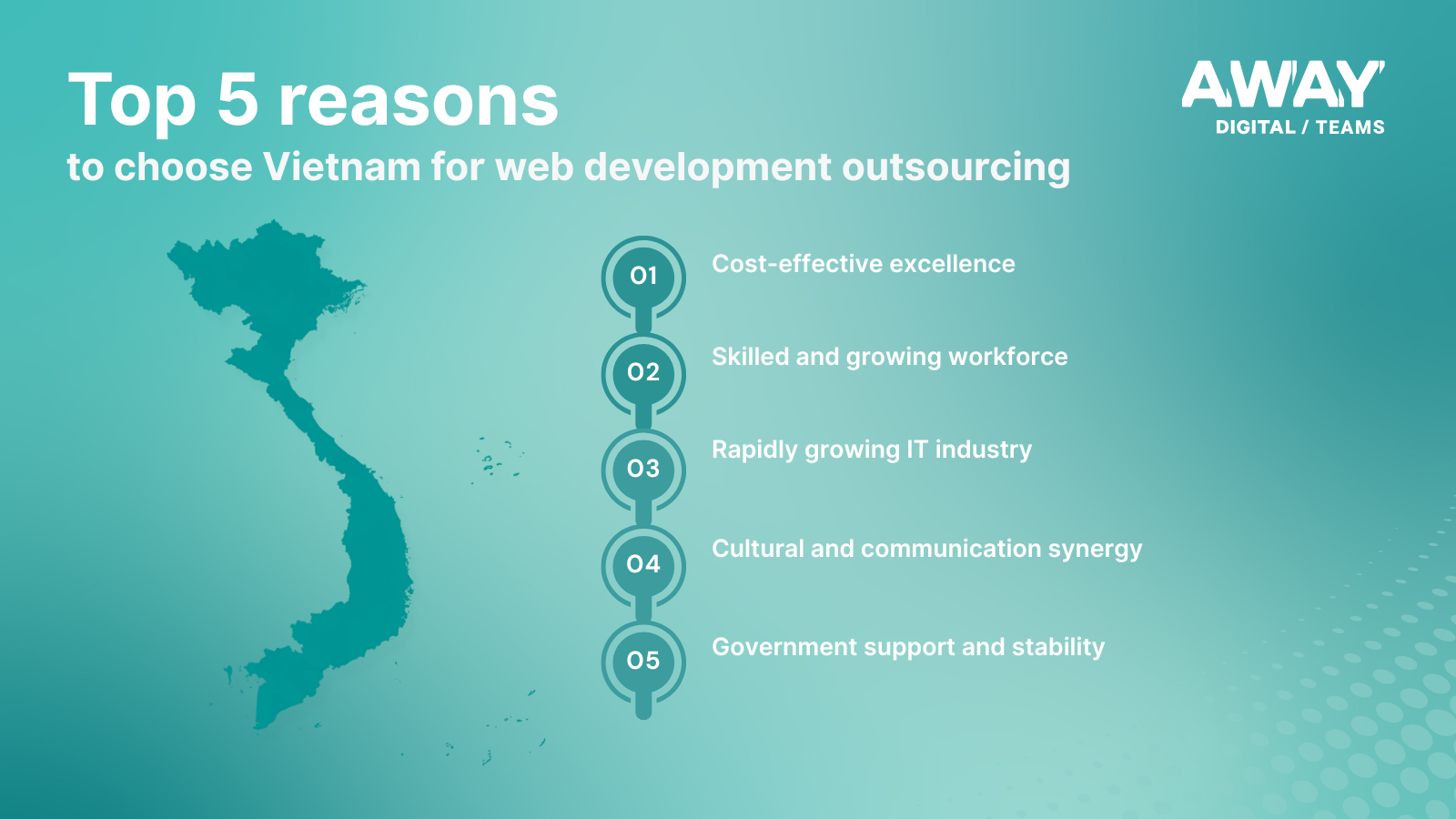As digital demands grow, so does the pressure to deliver modern, scalable web solutions – often with leaner teams. More businesses are realising they don’t have to do it all in-house. Outsourcing web development offers access to global expertise, faster delivery, and greater agility, without sacrificing quality or innovation.
It’s no surprise that the global IT outsourcing market is on track to hit $114.13 billion by 2025, with web development driving much of that growth. Vietnam is quickly making a name for itself as one of Asia’s leading destinations for web development outsourcing. With a highly skilled, tech-driven workforce and a strong emphasis on digital education, Vietnam offers a smart blend of innovation and technical depth, making it a go-to destination for companies looking to scale their digital capabilities.
In this guide, we’ll explore why web development teams in Vietnam are attracting attention from companies worldwide, and how this strategy could help your business scale smarter.
Table of contents
Key takeaways
- Development costs can be reduced by 30–50%
- Hiring web developers in Vietnam typically delivers 30–50% cost savings compared to the US and Western Europe, while maintaining modern tech standards when teams are structured and managed correctly.
- Vietnam is a strategic destination for web development outsourcing
- Vietnam combines a strong technical talent pool, improving English proficiency, and cultural alignment, making it suitable for long-term product development, not just cost-driven outsourcing.
- Dedicated teams outperform short-term project outsourcing:
- Building a dedicated offshore web team enables better knowledge retention, stronger ownership, and faster delivery over time compared to transactional, project-based outsourcing models.
Top 5 reasons to choose Vietnam for web development outsourcing

Vietnam has rapidly emerged as a premier destination for web development outsourcing, offering a unique blend of cost-efficiency, skilled professionals, and a supportive business environment. Here are five compelling reasons why businesses are turning to Vietnam for outsourcing high-performing web development teams:
1. Cost-effective excellence
Vietnam strikes a strong balance between affordability and technical expertise. Its web development teams consistently deliver robust, scalable solutions at highly competitive rates, without sacrificing code quality, UI/UX design, or project deadlines. With a proven track record of creating user-friendly, globally compliant websites for international clients, Vietnam demonstrates how cost efficiency and high standards can go hand in hand.
2. Skilled and growing workforce
Vietnam’s web development workforce is growing rapidly, with 560,000 professionals in tech-related roles and around 60,000 IT graduates entering the market each year. This steady pipeline of digitally fluent talent is trained in modern programming languages and frameworks, making it easier for businesses to scale web projects quickly. Backed by strong STEM education and partnerships with global tech companies, Vietnam’s developers bring both capability and adaptability to meet evolving digital demands.
3. Rapidly growing IT industry
Vietnam’s tech sector is on a fast upward trajectory, backed by strong government initiatives like the National Digital Transformation Programme. Ongoing investments in digital infrastructure, cloud technology, and undersea cable projects are creating a highly connected, innovation-friendly environment, ideal for scalable web development.
4. Cultural and communication synergy
Vietnamese developers are known for their adaptability and solid communication skills, particularly in English, which facilitates seamless collaboration with global clients. Ethical work culture and a collaborative mindset minimise cultural gaps, ensuring efficient project management and high client satisfaction. Vietnam’s time zone also provides a strategic advantage, offering overlapping work hours with Australia and American markets for real-time coordination.
5. Government support and stability
Vietnam’s government has made consistent efforts to foster a thriving IT ecosystem, offering tax incentives, pro-investment regulations, and funding for digital education. This strong policy support, combined with a stable political and economic landscape, has attracted major global tech players. Ranked 7th in Kearney’s 2023 Global Services Location Index, Vietnam stands out as a secure, reliable destination for companies looking to build long-term web development partnerships with confidence.
Steps to start outsourcing web development work
1. Define your project scope and select providers
Begin by clearly outlining your web development objectives, technical requirements, and budget constraints. Determine if your project calls for a highly customised platform, such as a SaaS product or eCommerce site, or a content management system like WordPress. Conduct thorough research on potential vendors by examining their portfolios, client testimonials, and case studies. Prioritise firms with proven experience in your industry or similar project types to ensure they understand your specific needs and challenges.
2. Evaluate proposals and formalise partnerships
Prepare and share comprehensive Requests for Proposal (RFPs) detailing your project scope, deadlines, deliverables, and technology preferences. Assess vendor responses for technical expertise, problem-solving capabilities, and communication clarity. Narrow down to those who align best with your requirements. Establish clear contracts that cover project milestones, payment terms, and data security to protect sensitive information and ensure a strong foundation for collaboration.
3. Oversee progress and ensure continuous support
Maintain consistent communication through project management platforms such as Jira, Trello, or Monday.com, scheduling regular check-ins to review progress, address issues, and adjust priorities as needed. Foster a transparent and collaborative relationship that allows for swift resolution of challenges and alignment with your evolving business goals. Confirm that your outsourcing partner provides ongoing maintenance, updates, and technical support post-launch, ensuring your web application remains secure, scalable, and performs optimally over time.
Key factors for choosing an outsourced web development team
Technical proficiency
Evaluate the team’s expertise with the technologies critical to your project, such as React.js, Node.js, or cloud platforms. Review their past work, request code samples, or conduct technical assessments to ensure they can deliver solutions that meet your quality and complexity requirements.
Clear and responsive communication
Strong communication minimises risks of misunderstandings and delays. Assess responsiveness during initial interactions and establish a clear communication plan covering update frequency, channels, and points of contact to maintain alignment throughout the project.
Proven track record
Review portfolios to assess the diversity and complexity of past projects, which demonstrate the team’s versatility and capability. Look for case studies, client testimonials, and outcomes that highlight their reliability, problem-solving skills, and ability to meet deadlines.
Cultural alignment
A good cultural fit fosters collaboration and smoother workflows. Explore the team’s work values and adaptability through informal meetings or workshops, ensuring their style and mindset align with your organisation for a productive partnership.
Identifying web development tasks to outsource
Outsourcing allows businesses to tap into specialised expertise for a range of development functions. Below are key roles often delegated to offshore teams to enhance delivery speed, quality, and scalability in web projects:
- Web developer: Outsourcing web developers to build responsive, SEO-friendly websites aligned with your brand identity and business objectives. They ensure optimal performance across devices and browsers.
- Front-end developer: Outsourced front-end developers will focus on user interface and experience, translating design mockups into interactive, accessible, and intuitive web pages using HTML, CSS, and JavaScript frameworks.
- Back-end developer: Outsource a back-end developer to develop the server-side logic, APIs, and databases that power your application, ensuring stability, scalability, and secure data handling.
- Full-stack developer: An outsourced full-stack developer offers end-to-end support, handling both client- and server-side development to deliver complete web solutions efficiently.
- UX/UI designer: An outsourced UX/UI designer will create visually engaging and user-centric design experiences that guide user behaviour and improve satisfaction on your digital platforms.
- QA/QC tester: Outsourced QA/QC testers ensure your website or application performs flawlessly by detecting bugs, verifying functionality, and running performance and usability tests before release.
- DevOps engineer: Outsource devOps engineers to automate and optimise deployment pipelines, enabling faster, more reliable updates and consistent delivery across environments.
- System administrator: Outsourcing a system admin to oversee web servers, databases, and network configurations to ensure your websites and online platforms run smoothly, securely, and with minimal downtime.
- Cloud engineer: An outsourced cloud engineer to support web development by configuring and maintaining cloud-based hosting environments, ensuring fast load times, scalability, and high availability for web platforms.
- Data analyst: Outsourcing a data analyst to analyse user behaviour, traffic patterns, and website performance metrics to deliver actionable insights that improve site functionality, user experience, and business outcomes.
- Data engineer: Outsource data engineers to design and maintain backend data systems that integrate with web applications, enabling features like search, personalisation, and real-time analytics through clean, reliable data pipelines.
Conclusion
Outsourcing web development isn’t just about cutting costs, it’s about unlocking speed, flexibility, and access to a vast pool of tech expertise that fuels innovation. Tapping into offshore teams lets you scale your business seamlessly, stay ahead of digital trends, and sharpen your competitive edge. With the right collaboration, your web development can become a powerful engine for growth, delivering high-quality results faster and positioning your business for sustained success.
For a deeper look at Vietnam’s rise as a global tech hub, read our latest analysis, How Vietnam’s tech talent is redefining web development, uncovering the key factors behind its growing influence and innovation in the industry.



